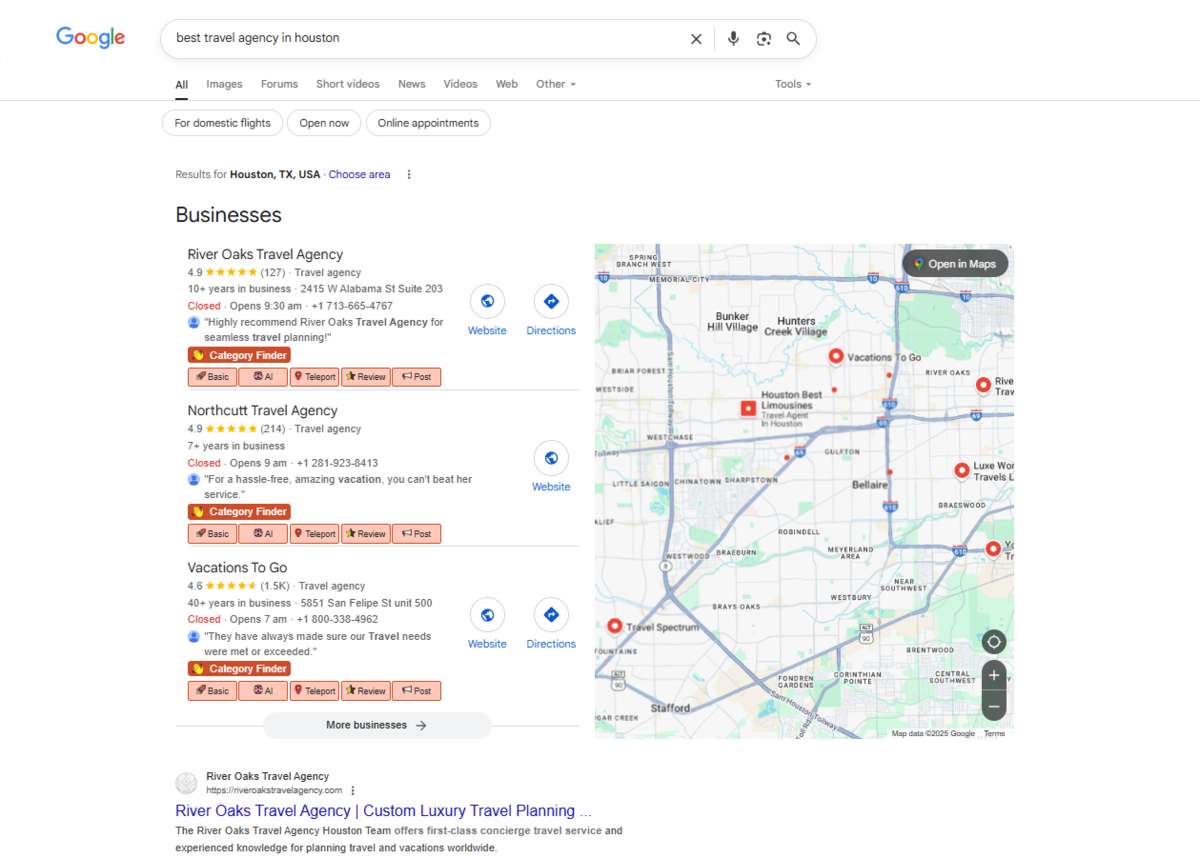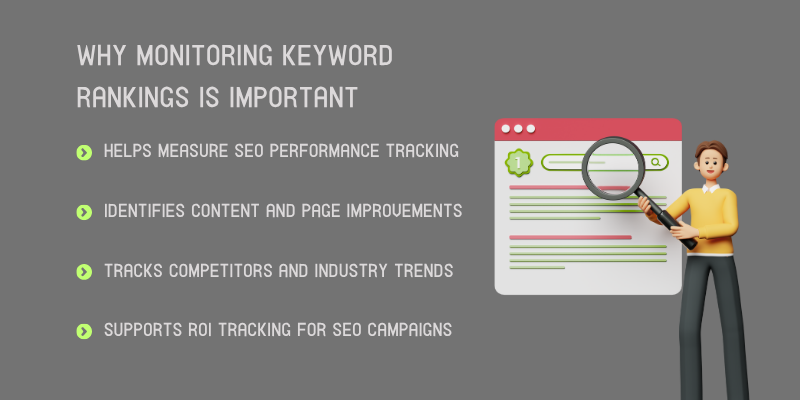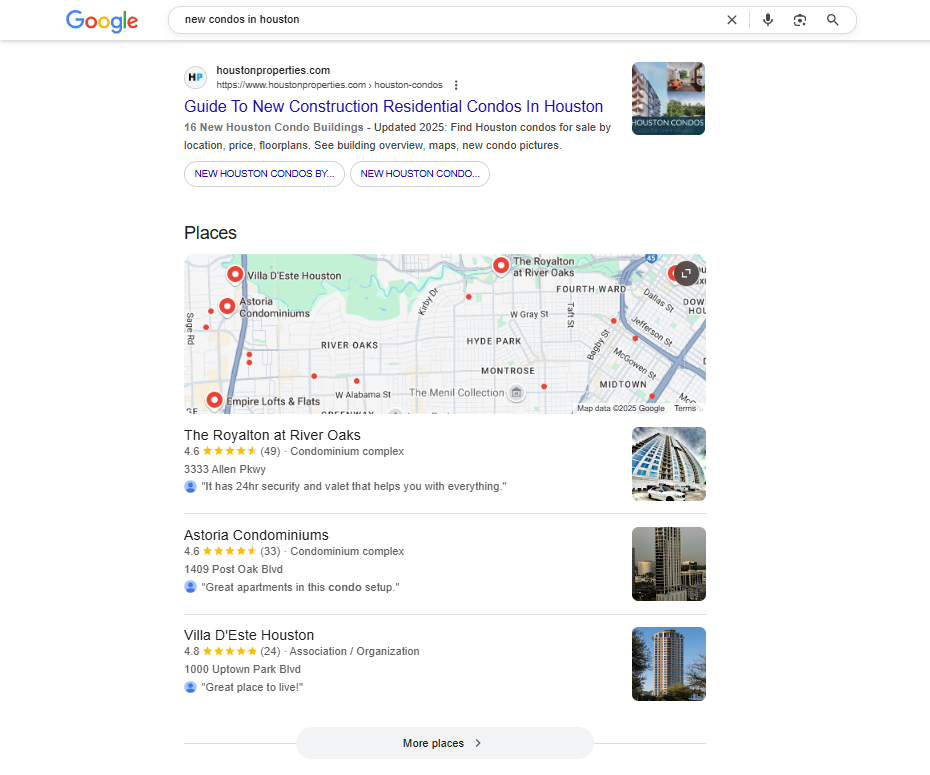Ever wonder why some websites pop up first on Google while others are buried way down the list? That’s all about keyword rankings, a key part of SEO (search engine optimization).
In simple terms, keyword ranking is where your web page shows up in search results when someone types in a specific word or phrase. Knowing how to check keyword ranking in Google can help you assess this more accurately.
Let’s say you run a Oil and Gas Marketing Agency in the US. that offers digitized operations, enhances marketing reach, and optimizes efficiency through intelligent automation. If your website shows up on page one when someone searches “best USA Oil and Gas operations,” you’re way more likely to get clicks (and bookings) than a competitor stuck on page five.
That’s why ranking higher matters. Iit means more visibility, more traffic, and ultimately, more customers choosing your intelligent automation experiences. Keeping an eye on your keyword rankings helps you know if your SEO efforts are actually working. Are you moving up? Slipping down? What keywords are bringing people in, and which ones are your competitors ranking for instead of you?
It’s all about staying sharp and adjusting your strategy when needed.
However, SEO rank trackers can help you keep track of your SEO ranking over time, making sure you're always on top of your performance.
In this article, we’ll walk you through how to check your keyword rankings easily and accurately, so you can stay ahead of the game and keep your site performing its best.
Get A Custom Oil and Gas Marketing Approach!
What is Keyword Ranking?
Keyword ranking is all about where your webpage shows up in Google when someone searches for a specific word or phrase.

For example, if someone searches for “best Travel Marketing Agency in Houston,” the websites that show up at the top are there because Google considers them the most relevant and reliable options for that search.
The higher your page ranks, the more likely people are to see and click on it, meaning more traffic to your site.
Google decides rankings based on several factors like how helpful and relevant your content is, how easy your site is to use, and the number of quality links pointing to your page.
If your page is ranked #1, that means Google sees it as the best match for what the user is looking for.
Check Our Travel Marketing Services!
SERPs (Search Engine Results Pages)
When you search for something on Google, the page you see with all the results is called the Search Engine Results Page, or SERP for short.
It’s not just a list of links, it’s a mix of different types of results, including:
- Organic listings (the unpaid ones)
- Paid ads
- Featured snippets (those quick answer boxes)
- Local results (like nearby businesses or maps)
- And sometimes even videos or news articles
The SERP is mainly divided into two parts:
- Organic Results: These are the free listings that show up because Google thinks they’re the best match for the search. Websites earn these spots by doing good SEO, like writing helpful content, improving site structure, and getting quality backlinks.
- Paid Results: These are the ads you’ll usually see at the top or bottom of the page. Companies pay to be there through platforms like Google Ads campaigns, and you’ll see a small “Ad” label next to them.
Understanding how SERPs work is super important. To get the most visibility, businesses often aim to show up in both the organic results and paid ads.
Start Improving Your SEO Today!
Why Monitoring Keyword Rankings is Important?
Monitoring keyword rankings plays a crucial role in ensuring the effectiveness of your SEO strategy.

Here are the key reasons why tracking keyword rankings is essential:
- Helps Measure SEO Performance Tracking: Tracking keyword rankings with Best SEO Tools for Keyword Ranking Reports helps you gauge the effectiveness of your SEO efforts. Rising rankings indicate successful strategies, while declining positions suggest areas for improvement.
- Identifies Content and Page Improvements: Ranking data reveals which pages need optimization. It highlights areas such as content, page speed, and on-page SEO, helping you focus on what needs updating to improve performance.
- Tracks Competitors and Industry Trends: Monitoring competitors' keyword rankings allows you to identify gaps, spot top-performing keywords, and stay on top of industry trends, giving you insights to refine your SEO strategy.
- Supports ROI Tracking for SEO Campaigns: Keyword rankings provide valuable data for tracking SEO ROI. By correlating ranking improvements with traffic, conversions, and sales, you can assess the effectiveness of your SEO investments and adjust strategies accordingly. Keyword rank trackers can assist in tracking fluctuations in rankings. By correlating ranking improvements with traffic, conversions, and sales, you can assess the effectiveness of your SEO investments.
How Google Determines Keyword Rankings?
Google uses a complex algorithm to determine the ranking of web pages for specific search queries. Getting backlinks For Your Website from authoritative and trustworthy sources, such as government websites or well-established publications, will have a greater impact on Google’s algorithm looks at backlinks, user experience, and mobile optimization. The algorithm is constantly evolving, incorporating various factors that help Google assess the relevance and quality of content.
Here’s an overview of the key factors that influence how Google determines keyword rankings:
1. Relevance
Relevance is the foundation of Google's ranking algorithm. When determining which page should rank for a particular keyword, Google evaluates how well the content matches the searcher's query. If the content on a page directly addresses the search query and provides valuable, useful information, it is more likely to rank higher.
Google uses a variety of signals to assess relevance:
- Keyword Usage: Keywords should be included naturally in titles, headings, and throughout the body content. However, overuse (keyword stuffing) can negatively affect rankings.
- Context and Synonyms: Google also looks at related terms and synonyms to ensure the content meets search intent, even if the exact keyword isn't used repeatedly.
2. Backlinks
Backlinks, or incoming links from other websites, are a critical ranking factor. Google views backlinks as a "vote of confidence" or endorsement of the quality and authority of your content.
The more high-quality, relevant backlinks a page has, the more likely it is to rank well for its targeted keywords.
However, not all backlinks are equal. The quality of the linking domain matters more than quantity.
Find Backlinks from authoritative and trustworthy sources, such as government websites or well-established publications, will have a greater impact on rankings than links from low-quality or spammy sites.
3. On-page SEO
On-page SEO refers to optimizing elements on your website to help Google understand the content of your pages. Key on-page factors include:
- Title Tags and Meta Descriptions: These provide Google and users with a summary of the page's content. Including the target keyword in these elements can help improve rankings.
- Header Tags (H1, H2, H3): Proper use of header tags organizes content for both users and search engines, making it easier to understand the structure of the page.
- Content Quality: High-quality, well-written, and informative content is crucial. Google values content that is helpful, informative, and provides a thorough answer to the user’s query.
- Internal Linking: Linking to other relevant pages within your own site helps Google understand the relationship between content and improves the overall SEO structure of your website
See Results with Our SEO Services
4. Mobile-Friendliness
As mobile usage continues to rise, Google places increasing importance on Mobile SEO Optimization. In fact, Google uses mobile-first indexing, meaning it primarily uses the mobile version of a site to determine rankings.
Websites that are not optimized for mobile devices may struggle to rank as well as mobile-friendly sites.
Responsive design, fast loading times, and easy-to-use navigation are critical for providing a positive user experience on mobile devices.
5. Page Speed
Page speed is another critical factor in determining rankings. Google wants to provide users with fast, seamless browsing experiences, so websites that load quickly are more likely to rank higher.
This is especially important for mobile users, where slow page loading can lead to higher bounce rates.
Tools like Google PageSpeed Insights can help website owners assess and improve their page speed. Factors that affect page speed include server performance, image optimization, and the use of caching.
6. RankBrain and User Behavior Signals
RankBrain is a machine learning-based component of Google’s algorithm that helps process search queries. It is designed to better understand the intent behind complex or ambiguous queries.
RankBrain can interpret queries that Google’s traditional algorithms might not fully understand by analyzing previous search patterns and user behavior.
User behavior signals, such as click-through rates (CTR), bounce rates, and time spent on a page, are important indicators of the relevance and quality of content.
If users click on a search result and stay on the page for a long time, it sends a positive signal to Google that the content is valuable.
Conversely, if users quickly leave the page (high bounce rate), it may indicate that the content did not meet their needs, potentially affecting rankings.
7. Importance of Search Intent Alignment
One of the most critical factors in determining keyword rankings is search intent the reason behind a user’s search.
Google aims to provide results that best match the intent behind a search query. There are typically four types of search intent:
- Informational: The user is looking for information (e.g., “how to start a blog”).
- Navigational: The user is looking for a specific website or page (e.g., “Facebook login”).
- Transactional: The user intends to make a purchase or take a specific action (e.g., “buy iPhone online”).
- Commercial Investigation: The user is looking for product comparisons or reviews (e.g., “best laptops for students”).
Ensuring your content aligns with the search intent of your target keywords is crucial for ranking well. For instance, a user searching for 'What Is The Digital Marketing Strategy That Tracks Users Across The Web?' expects a Digital Marketing Strategy, not a service page for a general marketing agency or a blog post that lacks detailed strategy insights.
Also Read: How Can I Check My Website SEO Ranking
What Are the Methods to Check Keyword Rankings?
There are several ways to check your keyword rankings, ranging from basic manual methods to more advanced tools like Google Search Console.
Here, we’ll walk through two primary methods to check keyword rankings: Manual Search and Google Search Console.
1. Manual Search (Basic)

The manual search method is a quick and straightforward way to check where your website ranks for a particular keyword.
However, this method has some limitations, which should be considered before relying on it too heavily.
- Open Incognito Mode: Use a private browsing window to avoid personalized search results.
- Clear Cookies and Cache: Clear your browser’s cookies and cache to prevent past search history from affecting results.
- Search the Keyword: Type your target keyword in Google and check your website’s position in the organic results.
2. Google Search Console (Free Method)
Google Search Console (GSC) is a powerful, free tool provided by Google that gives you insights into how your website is performing in search results.
It offers a more accurate and reliable way to check your keyword rankings compared to manual search, and it’s essential for any local and international SEO strategy.
- Go to the Performance Tab: Log into Google Search Console and navigate to the Performance tab to access key metrics like clicks, impressions, and average position.
- Filter by Query: Enter your target keyword in the search bar to focus on specific keyword performance.
- Check Average Position: Review the Average Position to see where your website ranks for the selected keyword.
Additionally, Google Search Console allows you to track google keywords ranking and monitor fluctuations over time.
Top 7 Keyword Rank Tracking Tools (Free & Paid)
Several tools can help you track keyword rankings effectively. For instance, AccuRanker offers fast and accurate data.
Meanwhile, SEO audit tools can enhance your ability to optimize your campaigns by providing insights into your website ranking and performance. By leveraging these tools, businesses can get accurate data about their keyword rankings and optimize their campaigns accordingly.
Check Your Keyword Rankings In Real Time!
1. SEMrush
SEMrush is a popular SEO tool that provides a robust set of features for keyword tracking, site audits, and competitor analysis.
Its user-friendly dashboard allows users to monitor their website's rankings, track keyword performance, and analyze competitors’ SEO strategies.
SEMrush’s keyword tracking project setup helps you monitor your targeted keywords over time, providing insights into ranking fluctuations and SEO progress.
This tool is widely used by both beginners and seasoned marketers for its comprehensive functionality and ease of use.
2. Ahrefs
Ahrefs is another powerful SEO tool known for its in-depth keyword research and rank tracking features. It shows keyword rankings along with detailed SERP data, allowing users to track performance over time.
Ahrefs’ SERP History feature provides valuable insights into past ranking data, helping you understand how rankings evolve.
Additionally, it offers rank tracking alerts, notifying users of any significant changes in keyword positions, which is crucial for timely adjustments to SEO strategies.
3. Ubersuggest (Free + Paid)
Ubersuggest, developed by Neil Patel, is a user-friendly SEO tool that offers both free and paid versions.
It provides basic keyword tracking features, making it suitable for beginners. Ubersuggest allows users to track keyword rankings and gain insights into their competitors’ SEO performance.
Additionally, it helps users analyze keyword ranking google and understand how their website ranks on Google’s search results.
With a simple interface and affordable pricing, it’s an ideal choice for those new to SEO or small businesses looking to track rankings without a steep learning curve.
4. SerpRobot / SERPWatcher / Nightwatch
SerpRobot, SERPWatcher, and Nightwatch are specialized tools designed for agencies and freelancers managing multiple clients or large keyword sets.
These tools provide accurate keyword tracking, detailed ranking reports, and the ability to monitor rankings across various locations and devices.
They’re especially beneficial for digital marketers who need to manage and analyze SEO campaigns for multiple clients simultaneously, offering custom reporting and automated updates to save time.
5. Moz
Moz is a well-known SEO platform that offers keyword tracking along with site audit and link-building tools.
Moz’s keyword tracking tool provides users with daily updates on rankings and insights into keyword performance, making it a great all-in-one tool for SEO professionals.
Additionally, Moz allows for a Google keyword ranking check, helping you monitor your website’s position on Google search results.
6. Rank Tracker by SEO PowerSuite
Rank Tracker is a versatile tool that offers advanced rank tracking features, including the ability to track keywords across different search engines, countries, and languages.
Its customizable reports make it ideal for agencies and businesses needing comprehensive keyword data to monitor keyword ranking in SEO and assess SEO performance across various platforms.
7. AccuRanker
AccuRanker, Known for its fast and accurate keyword ranking data, AccuRanker delivers detailed reports and is praised for its ease of use.
It’s particularly useful for marketers who need real-time data to track keyword performance and adjust strategies accordingly.
5 Common Keyword Tracking Mistakes to Avoid
Common keyword tracking mistakes include obsessing over daily fluctuations, ignoring search intent, not tracking conversions, focusing solely on vanity keywords, and neglecting long-tail keywords.
- Obsessing Over Daily Changes: Rankings fluctuate regularly, so focusing on daily shifts can be misleading. Track trends over time instead.
- Ignoring Search Intent: Rankings alone don't matter if the content doesn’t align with what users are looking for.
- Not Tracking Conversions Along with Rank: Rankings should be paired with conversion data to measure actual SEO success.
- Focusing Only on Vanity Keywords: Prioritize keywords that drive valuable traffic and conversions, not just high-traffic terms.
- Forgetting Long-Tail Keywords: Long-tail keywords can bring highly targeted traffic and should be part of your SEO strategy.
Top 5 Tips to Improve Keyword Ranking
To improve keyword rankings, focus on on-page SEO, high-quality content, internal linking, fast page load speed, mobile optimization, and demonstrating E-E-A-T (Experience, Expertise, Authoritativeness, Trustworthiness).
- On-page SEO Best Practices: Ensure proper use of title tags, meta descriptions, header tags, and keyword optimization to help search engines understand your content.
- High-Quality Content Updates: Regularly refresh content to ensure it remains relevant, valuable, and comprehensive to meet user needs.
- Internal Linking Strategy: Use internal links to guide visitors to related content, improving site navigation and helping search engines crawl your pages effectively.
- Page Load Speed: Optimize your website’s speed by compressing images, leveraging browser caching, and improving server performance to reduce bounce rates.
- Mobile Optimization: Ensure your site is responsive and performs well on mobile devices, as Google uses mobile-first indexing.
Frequently Asked Questions (FAQs)
What is Google Keyword Ranking?
Google keyword ranking is the position of your webpage in Google search results for a specific keyword. Higher rankings mean more visibility and potential clicks.
How Does Google Determine Keyword Rankings?
Google ranks pages based on content relevance, backlinks, user experience (e.g., page speed, mobile-friendliness), on-page SEO, and domain authority.
How Can I Check My Keyword Ranking in Google?
Use tools like Google Search Console, SEMrush, Ahrefs, or manually search in incognito mode. Tools offer more detailed insights.
What Keyword Rank Checker is Best?
Top tools include Google Search Console (free), SEMrush, Ahrefs, and Moz. Ubersuggest is a good free alternative.
How to Find the Best Keywords on Google?
Use Google Keyword Planner, SEMrush, Ahrefs, Google Trends, or competitor analysis to find high-traffic keywords relevant to your niche.
How to Rank #1 on Google Search?
Create high-quality, optimized content, build backlinks, improve user experience (site speed, mobile optimization), and track performance with SEO tools.
Why Does Keyword Ranking Matter for Google SEO?
Higher keyword rankings increase your site’s visibility, driving more traffic, engagement, and conversions.
Can I Track My Keyword Ranking in SEO for Free?
Yes, Google Search Console provides free insights into keyword performance. Ubersuggest also offers limited free tracking.
Conclusion
In summary, tracking keyword rankings is a vital component of any successful SEO strategy. It helps you measure your progress, identify areas for improvement, and make informed decisions to optimize your content. Whether using free tools like Google Search Console or paid options like SEMrush, a mix of both can provide valuable insights into your website's performance.
If you're unsure about how to check keyword ranking in Google, there are several tools that can guide you through the process. For businesses working with agencies like Centric, a digital transformation agency, setting up a robust keyword tracking system is essential to ensure you're staying ahead of the competition. Set up a keyword tracking system today to monitor your rankings, measure your success, and continuously grow your online visibility.









